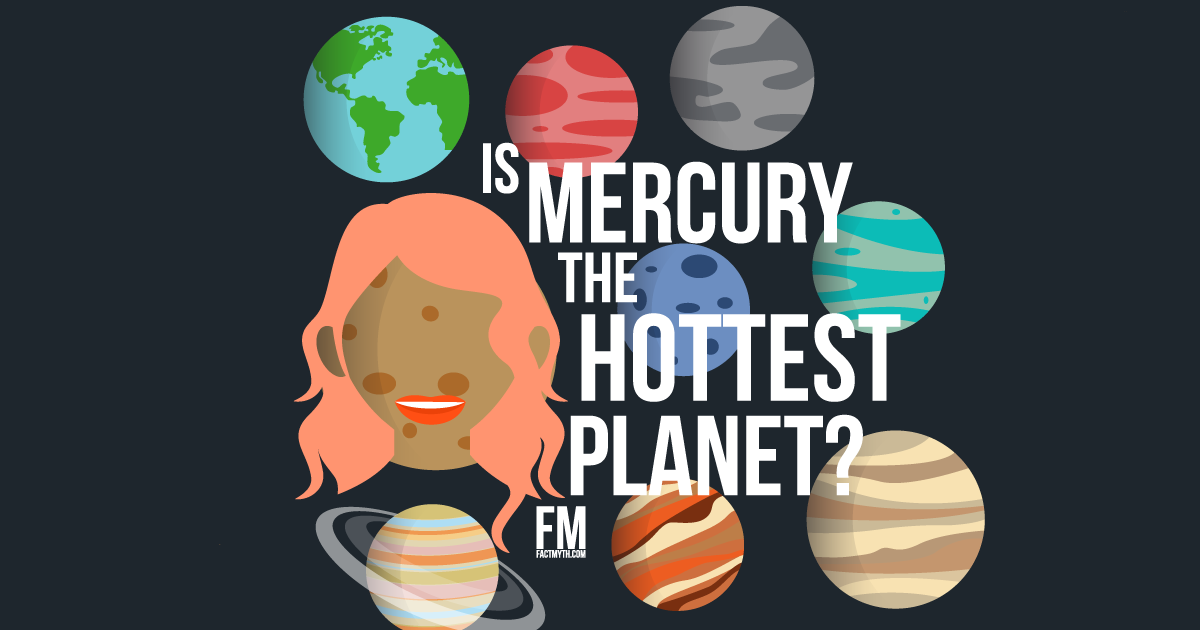Venus is the hottest planet in the solar system, even though Mercury is closer to the sun its atmosphere isn’t thick enough to trap in heat.
Mercury is the Hottest Planet myth

Is Mercury the Hottest Planet?
Mercury is the closest planet to the sun, and thus receives the most direct heat. However, Venus is hotter, as Mercury doesn’t have an atmosphere thick enough to trap and hold heat.
What is the Hottest Planet in the Solar System?
Since Mercury’s atmosphere can’t trap heat, the second closest planet to the Sun – Venus – is the hottest planet in our solar system.
Venus’s atmosphere is 93 times thicker than Earth’s. Venus’ heat-trapping atmosphere makes it the hottest planet in the solar system with a consistent temperature of 864 ºF (462 ºC).[1]
Is Mercury the Hottest Planet in our Solar System.FACT: The planets were all named after Roman Gods in Roman times (similar to the way in which the months were named after gods). Mercury is the quickest god (because Mercury is the quickest to revolve around the sun). Venus is the goddess of love and sexuality, so it is only appropriate that her planet is hot (although this, unlike the revolutions of the planets, was not known in ancient Rome).
The Effect of Atmosphere on a Planet’s Temperature
While proximity to the sun has an impact on a planet’s temperature, there is a second factor involved. Like Earth, all planets with a thick enough atmosphere are subject to the Greenhouse Effect, in which radiation gets trapped in the planet’s atmosphere and heats up the planet’s surface.[2] Because Venus’ atmosphere is almost entirely consistent of (96%) carbon dioxide – a heavy and dense gas – its atmosphere is extremely thick and thus is much better at trapping heat and radiation near the planet.

Is Mercury hotter than Venus? The answer is a matter of atmosphere. Source: Modified from Artprojectsforkids.org
Mercury vs. Venus
While Mercury is the closest planet to the sun, it also has a very thin atmosphere.[3] With practically no atmosphere, it doesn’t trap heat very well. As a result, the part of the planet in direct sunlight reaches scalding temperatures of about 800 °F (430 °C), while the part of the planet that’s facing away from the sun drops to a temperature as low as 280 °F (-173 °C).
In contrast, Venus’ heavy atmosphere is incredibly thick (93 times thicker than Earth’s atmosphere).[4] So, as the second planet from the sun, even though it’s about twice as far from the sun as Mercury, trapped radiation heats the planet to a Solar-System record of 864 ºF (462 ºC). In fact, the atmosphere does such a good job a trapping heat that the entire planet is the same temperature, regardless of whether it’s in direct sunlight or not. In other words, on Venus, the temperature is just as steamy at night as it is in the middle of the day!
Mars: Crash Course Astronomy #13.How Hot is Venus?
It’s hard to conceptualize exactly how hot 864 ºF is. So, let’s put it in perspective:
- The temperature (in Celsius) on Venus is about 33 times the average temperature on Earth (14 ºC).
- The surface of Venus is hot enough to melt lead, zinc, selenium, and tin.[5]
- The surface of Venus is hot enough to boil cadmium, mercury, and potassium.
- Venus is so hot that its surface consists mostly of molten volcanic lava. When the clouds of sulphuric acid get too dense and start to rain, the acid evaporates long before it touches the surface of the planet – the planet is too hot for precipitation!
- “Venus” Astronomytoday.com
- “Greenhouse effect” Wikipedia.org
- “WHAT IS THE AVERAGE SURFACE TEMPERATURE OF THE PLANETS IN OUR SOLAR SYSTEM?” Universitytoday.com
- “The Hottest Planet in the Solar System” ASGH.org
- “Metals – Melting Temperatures” Engineeringtoolbox.com
